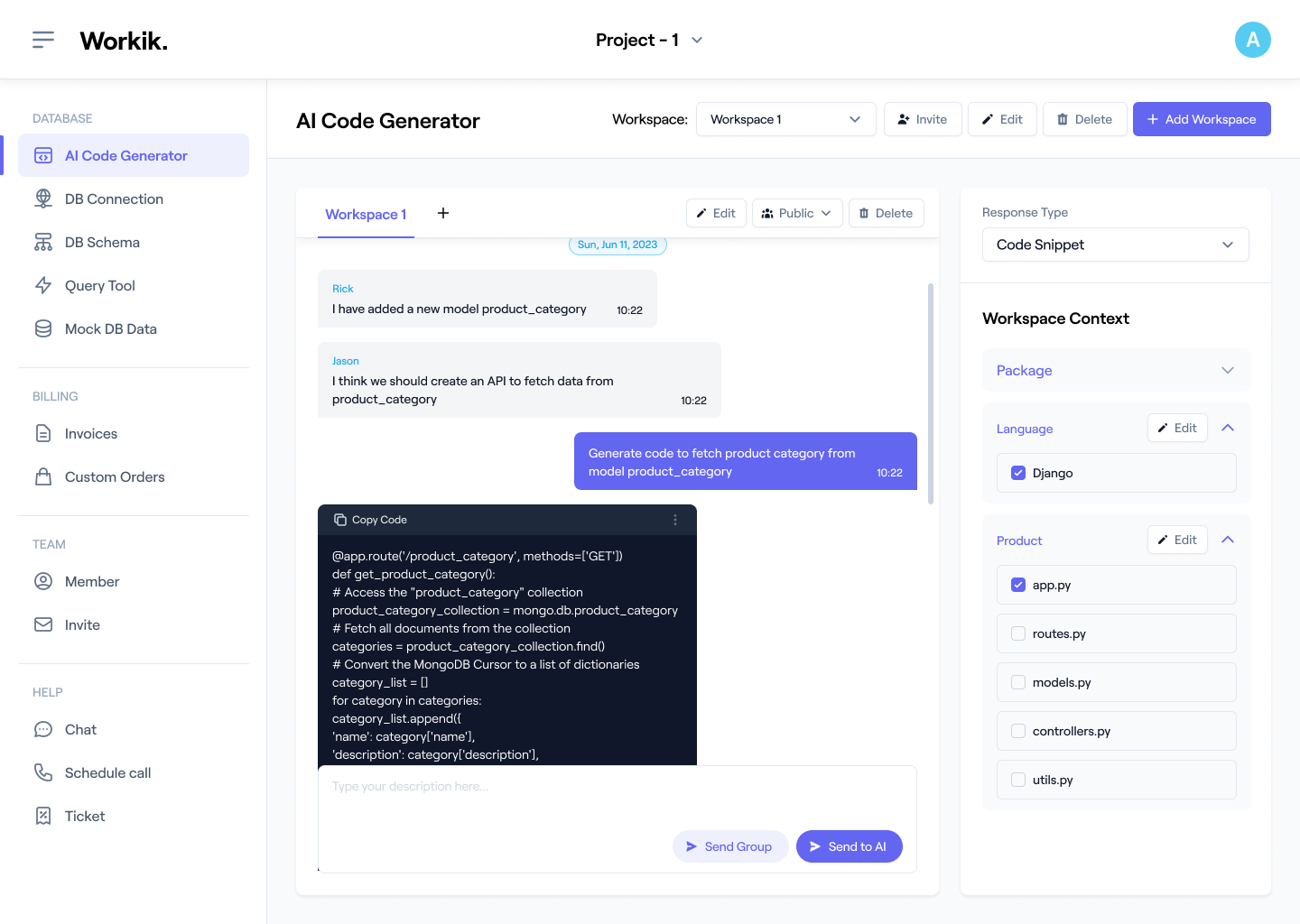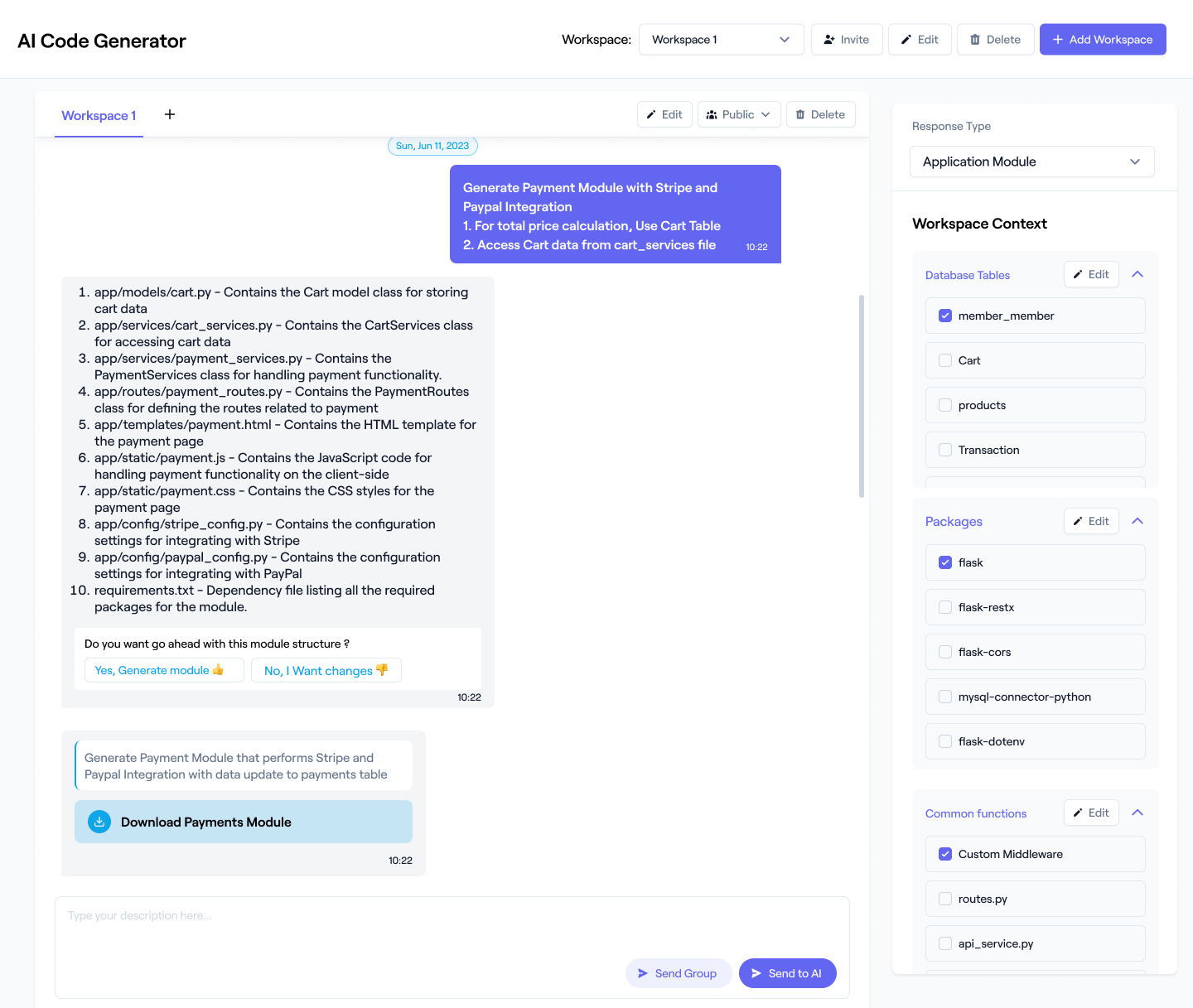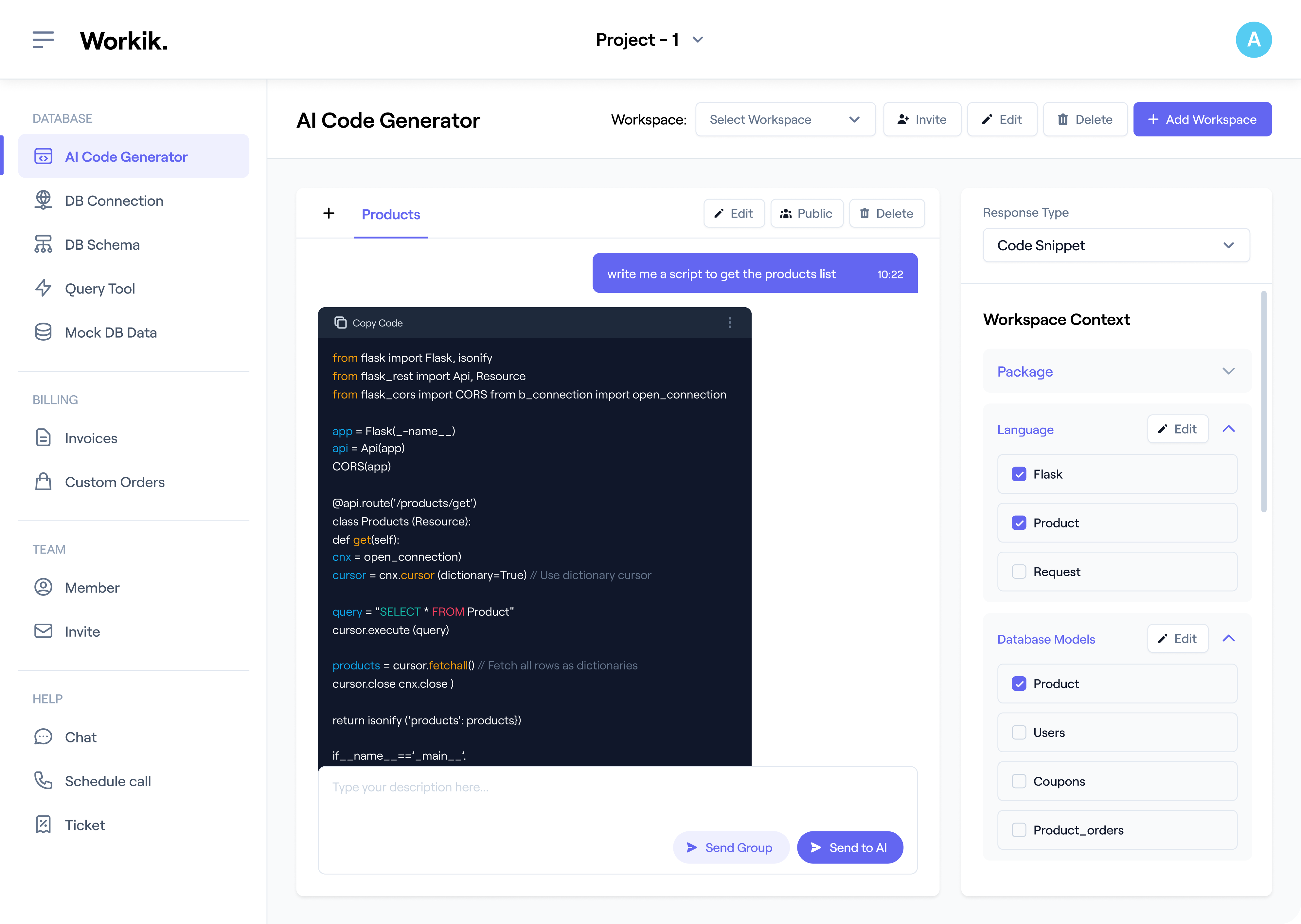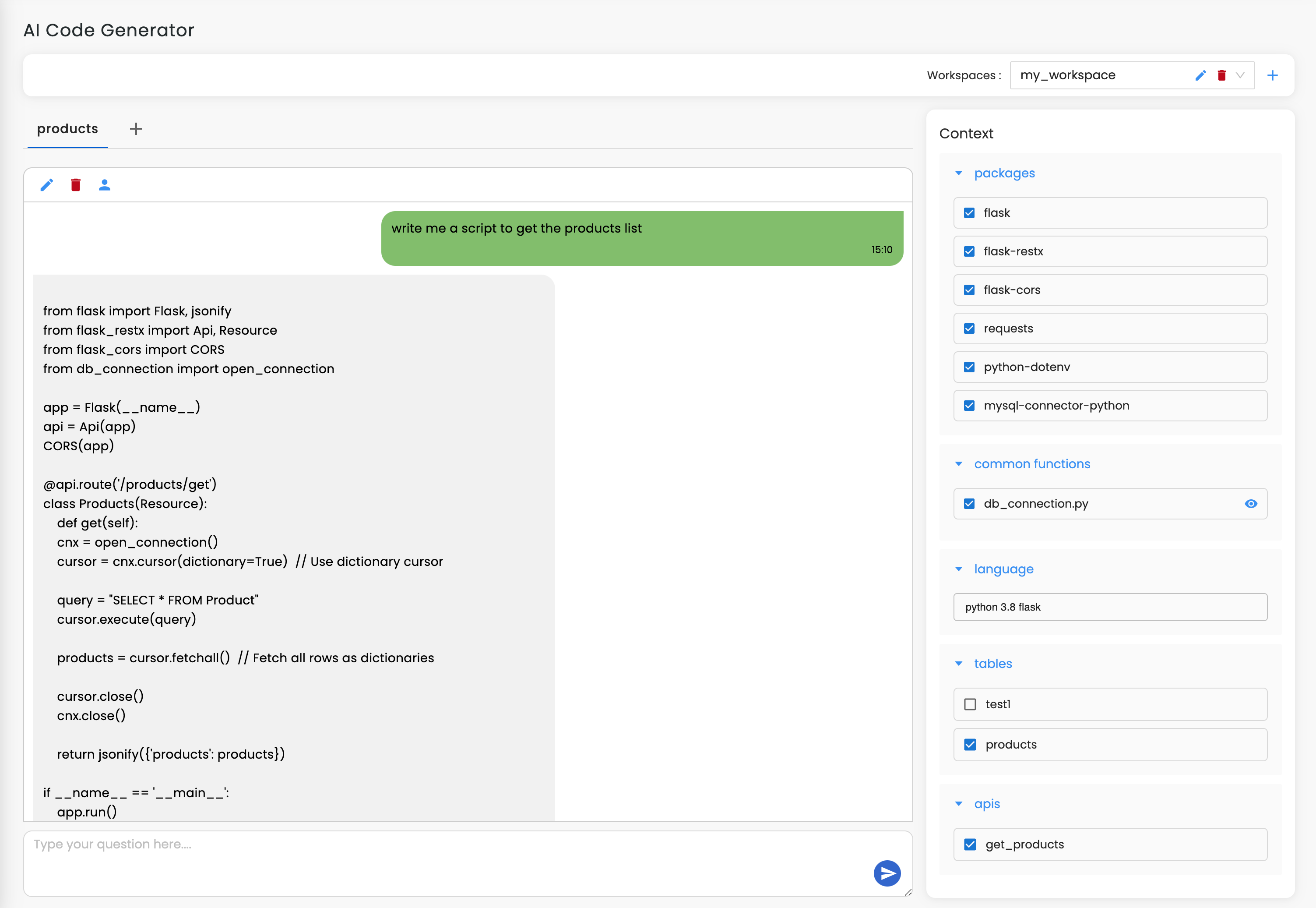
Join our community to see how developers are using Workik AI everyday.
Features

Generate Instant Apps
AI easily creates end-to-end applications, from routing to database models, ideal for APIs, admin panels, dashboards & more.

Automate Database Integration
AI handles SQL/NoSQL connections with Flask-SQLAlchemy and Flask-Migrate, automating CRUD operations and schema migrations.

Customize API Setup
Generate RESTful APIs including dynamic endpoints, automated error handling, built-in authentication.

Implement User Authentication
Use AI to implement secure, role-based login with Flask-Login & JWT for session management and access control.
How it works
Create your free Workik account in seconds to access Workik’s AI assistance for Flask.
Link your GitHub, GitLab, or Bitbucket repositories. Add project-specific contexts such as database schemas, Flask extensions, custom libraries or more, allowing AI to tailor its code suggestions.
Input your specifications, and Get AI-driven suggestions, debug code, or generate full Flask modules. Whether building APIs or managing routing, AI simplifies your Flask development.
Invite your team to collaborate on Flask projects in Workik. Use the code ready for deployment to cloud platforms or servers.


Expand


Expand


Expand


Expand


Expand


Expand


Expand


TESTIMONIALS
Real Stories, Real Results with Workik
Workik’s AI Flask generator cut hours off our setup. I built a scalable API with secure authentication in no time!

Alyssa Ray
Senior Backend Developer
Workik’s tools helped us build a real-time dashboard effortlessly. Flask-SocketIO integration was seamless!

Emma Rodgers
Lead Software Engineer
Workik’s AI made Flask-SQLAlchemy and Flask-Migrate a breeze for handling migrations and CRUD!

Lucas Newman
Database Administrator
What are some popular use cases for Workik's AI-powered Flask code generator?


Popular use cases for Workik's AI-powered Flask code generator include but are not limited to:
* Instantly generate CRUD APIs with minimal setup.
* Automate and scale microservices with AI-driven routing.
* Build secure backends with authentication and session management.
* Add live chat or notifications using Flask-SocketIO.
* Easily deploy Flask apps with Docker and Kubernetes.
What context-setting options are available in Workik’s AI for Flask code generator?


Workik provides flexible context-setting options to personalize the AI-generated Flask code. Users can:
* Add Flask-SQLAlchemy, Flask-WTF, or others to fit your needs.
* Sync with GitHub, GitLab, or Bitbucket to integrate existing code.
* Upload schemas for automated CRUD operations with PostgreSQL, MySQL, or MongoDB.
* Seamlessly integrate third-party APIs.
* Define logic or methods to tailor AI-generated code.
What security features does Workik implement in Flask apps?


Workik integrates several security best practices, including CSRF protection via Flask-WTF, secure session management with Flask-Login, and JWT for token-based authentication. You can also enable HTTPS, input validation, and rate limiting to protect against threats like SQL injection, XSS, and brute-force attacks.
How does Workik handle performance optimization for Flask applications?


Workik follows Flask best practices for performance optimization by integrating Flask-Caching for response caching and supporting Redis/Memcached to reduce server load. Additionally, it optimizes database connections using Flask-SQLAlchemy, ensuring that your Flask app can scale efficiently under heavy traffic.
Can I use WebSockets with Flask in Workik?


Absolutely. Workik supports Flask-SocketIO, allowing you to implement real-time communication for use cases like live chat, real-time notifications, or collaborative tools. Workik automates the WebSocket setup and event handling, ensuring your app can scale for high-volume, real-time connections.
Can Workik integrate third-party authentication (OAuth2, SAML) in Flask?


Yes, Workik supports third-party authentication using OAuth2 providers (Google, GitHub, Facebook) and enterprise-grade protocols like SAML for single sign-on (SSO). The AI handles token exchange, session management, and user authentication seamlessly, making it easy to implement these features in your Flask apps.
Does Workik support task queues and background jobs in Flask apps?


Yes, Workik integrates Celery for task queues, enabling Flask apps to process background tasks asynchronously. Whether handling large file uploads, sending emails, or processing data, Workik sets up Celery with Redis or RabbitMQ for efficient task execution outside the request-response cycle.
How does Workik manage complex routing and URL handling in Flask?


Workik automates the setup of advanced routing, including dynamic URL mapping and parameterized routes in Flask. It supports RESTful APIs and allows you to create custom route converters, ensuring that your application handles complex URL patterns and request processing efficiently.
Generate Code For Free

Flask: Question and Answer
Flask is a lightweight, Python-based web framework designed to simplify the development of web applications and APIs. It provides flexibility by allowing developers to build apps with minimal configuration, making it ideal for projects ranging from small apps to large-scale microservices.
Popular frameworks and libraries used with Flask include:
Languages:
Python
Database Integration:
Flask-SQLAlchemy, Flask-Migrate
Security:
Flask-Login, Flask-JWT-Extended
Web Development:
Jinja2, Flask-WTF
Real-Time Communication:
Flask-SocketIO
API Documentation:
Swagger, Flask-RESTPlus
Testing:
PyTest, UnitTest
Common use cases for Flask include but are not limited to:
REST API Development:
Quickly build robust APIs with minimal setup.
Microservices Architecture:
Develop lightweight, scalable microservices.
Web Application Backends:
Create dynamic, secure backends for web apps.
Real-time Applications:
Build chat, notifications, or live updates using WebSockets.
Cloud-Native Applications:
Deploy Flask apps to cloud platforms using Docker and Kubernetes.
Internal Tools:
Develop management dashboards or admin panels.
Career opportunities for Flask developers include roles such as Backend Developer, Full-Stack Developer, API Developer, Microservices Architect, DevOps Engineer, and Cloud Solutions Engineer. These roles focus on building scalable web applications, developing RESTful APIs, managing backend logic, deploying cloud-based solutions, and integrating with databases using Flask.
Workik AI enhances Flask development by:
Code Generation:
Instantly creates Flask APIs, routes, and models.
Configuration:
Automatically sets up Flask-SQLAlchemy, Flask-Login, and more.
Debugging:
Offers AI-driven solutions to fix issues quickly.
Refactoring:
Optimizes and cleans up existing Flask code.
Performance:
Identifies bottlenecks and suggests efficiency improvements.
Documentation:
Auto-generates detailed project documentation.
Explore more on Workik
Get in touch
Don't miss any updates of our product.
© Workik Inc. 2026 All rights reserved.

